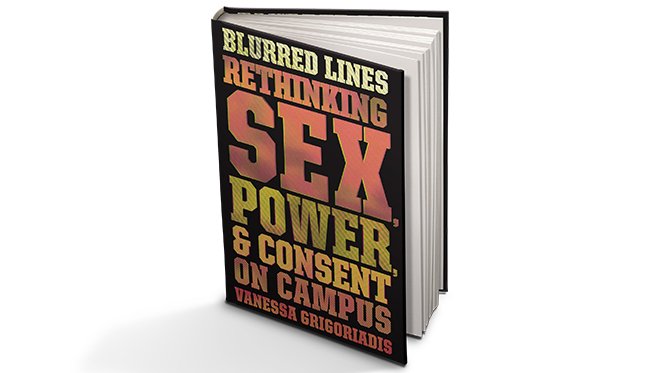A contributing writer for New York, Vanity Fair and the New York Times Magazine, New York–based Vanessa Grigoriadis focuses on pop culture and youth movements in her work. She won a National Magazine Award in 2007 for her profile of designer Karl Lagerfeld. Worth spoke with Grigoriadis about her new book, Blurred Lines: Rethinking Sex, Power & Consent on Campus, and the often hazy distinction between sexual assault and consensual sex on American college campuses.
Here is an extended version of the conversation with Grigoriadis that first appeared in Worth’s November 2017-January 2018 print issue.
Q: Where is sexual assault among post-adolescents most prevalent?
A: Obviously there are sexual assaults across America, but for college-aged Americans, particularly women, the most prestigious universities are the ones that actually have the most risk because they are residential. They have dorms, unsupervised, and they pushed the drinking off the campus to fraternity houses. The actual universities have tried to legally buffer themselves from the binge-drinking problem that exists and push it to the fringe of the campus.

How should colleges respond to rape on campus?
We’re talking about acquaintance assault, not physically violent assault—boys who take advantage of girls. I think the truth in many cases is a bit murky… unless the guy had a gun, unless there are bruises, unless there’s physical evidence, which is pretty rare in these kind of cases, because these cases are about consent. Generally, in college the most common situation involves a girl who’s passed out. There’s no physical evidence there. Or she was in a blackout, and that’s where it gets really crazy—was she conscious, not?
So what should colleges do?
First, I don’t think they’re doing as bad a job as everybody thinks. We only think that because the media tells us that. Because of federal privacy regulation laws, [universities] can’t speak publicly about any individual case. So we have a side that has never been able to give its own story. All the prestigious private schools are starting to change their Title IX offices. Now they’re hiring almost exclusively former criminal prosecutors and defense attorneys. If those people are handling it, I feel much more confident that this will go better.
But we’re never going to get around the fact that sexual assault is really hard to prove. No matter where you are, you are going to run into this issue. Whatever punishment you give him, the victim is going to say it’s not enough. And the boy is going to say it’s totally unfair.

“I don’t want to victim-blame girls, but there is individual responsibility…”
How can parents prepare their children for sex in college?
Parents have a hard time talking about sex with their kids, and certainly a harder time talking about sexual assault. You don’t have to do much of that to keep your kids safe. The most important thing is: For girls, if you’re going to drink, you must drink in moderation. After, say, nine drinks, there’s an elevated risk of sexual assault. All this stuff happens at the beginning of school between people who don’t know each other very well. The most risky thing is if a freshman girl is at a frat party. The risk is not walking around campus—it is with a guy you don’t know particularly well at an off-campus apartment.
And for boys?
Boys are on group chat. Your floor may have a group chat, or fraternity pledge class, your athletic team. The peer pressure that exists [among boys] reinforces what boys already think: I got to college and now I get laid! And this girl, who wears a mini-skirt and is flirting with me and walking to my dorm, is clearly going to have sex with me! But the girl isn’t really sure she wants to have sex, and the guy is, and then it’s a miscommunication that happens from there.
In cases where the consent is murky, those are the cases I believe should have lower punishment. We should be focusing on re-educating these boys. Kicking a boy out of school is severe. He’s not only humiliated, but that’s on his transcript—expelled for sexual misconduct. The point of Title IX is that everybody deserves equal access to education.
Doesn’t this sound like victim-blaming?
I don’t want to victim-blame girls, but there is individual responsibility. That exists. I have no problem with a girl wearing whatever she wants or flirting, but she also has to remain conscious of herself and her actions.
“So much of this could be fixed with everybody being a little more conscious.”
So much of this could be fixed with everybody being a little more conscious—a little less drinking, getting verbal consent from the other person, getting an answer, which is what universities want students to do. All Ivy League universities require that now.
If we’re talking about individual responsibility, do all of these cases warrant an investigation?
Not a criminal investigation, no. Our criminal justice system isn’t so awesome when it comes to rape. There isn’t a lot of evidence here. Prosecutors don’t want these cases. What Obama wanted was for us to treat sexual assault in college like sexual harassment in the workplace. If we don’t accept these things in the workplace, why do we accept them in a college, which is a place where people are going to be educated? But the complicated part is that they live there, so it’s not as cut and dry. I don’t think the criminal justice system is the answer. Making the colleges do a better job is the answer.
Blurred Lines: Rethinking Sex, Power & Consent on Campus, Houghton Mifflin Harcourt, $28, 368 pages











